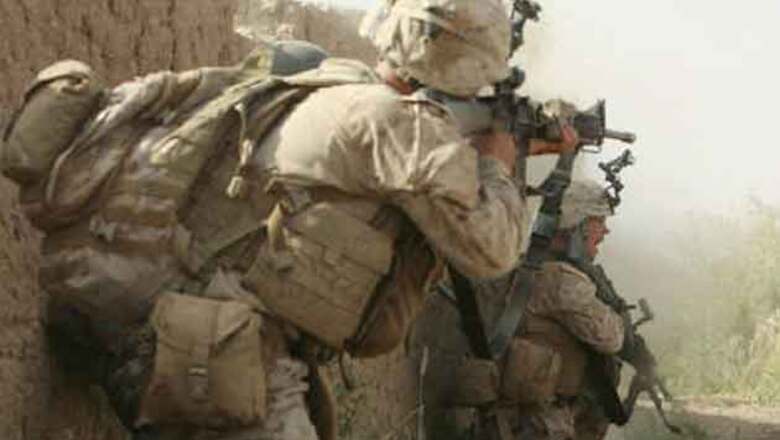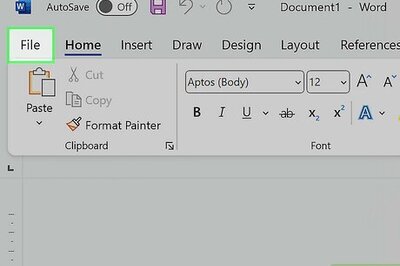
views
Washington: U.S. officials in Afghanistan strongly suspected Pakistan was secretly supporting the Taliban while taking massive amounts of American aid, military reports leaked on Sunday show, raising new questions about President Barack Obama's war strategy.
The White House responded immediately with a strong condemnation of the disclosures by the organization WikiLeaks, saying it could threaten national security and endanger the lives of Americans and those of its allies.
But Obama's national security adviser, Jim Jones, said the leak would not affect "our ongoing commitment to deepen our partnerships with Afghanistan and Pakistan."
The revelations contained in more than 90,000 classified documents could fuel growing doubts in Congress about Obama's war strategy when the U.S. death toll is soaring and public support for the 9-year-old war is eroding.
Despite efforts by the White House to contain the political fallout, Senate Foreign Relations Committee Chairman John Kerry, one of Obama's closest Democratic allies, said the leaked documents raised "serious questions about the reality of America's policy toward Pakistan and Afghanistan."
"Those policies are at a critical stage and these documents may very well underscore the stakes and make the calibrations needed to get the policy right more urgent," Kerry said.
The documents about Pakistan's alleged double-dealing could provide fodder for lawmakers who want to hold Obama to a timeline for withdrawing troops starting next July as well as increase pressure on the administration to outline a clear exit strategy.
Under the heading "Afghan War Diary, the 91,000 documents collected from across the U.S. military in Afghanistan, cover the war from 2004 to 2010, WikiLeaks said in a summary.
One of them discusses a meeting of insurgents attended by a former senior Pakistani intelligence official who appears to be working against U.S. forces in Afghanistan.
The documents were made available first to The New York Times, Britain's The Guardian newspaper and German weekly Der Spiegel.
The Times reported the documents showed Pakistan actively collaborating with the Afghan insurgency.
"The documents ... suggest that Pakistan, an ostensible ally of the United States, allows representatives of its spy service to meet directly with the Taliban in secret strategy sessions to organize networks of militant groups that fight against American soldiers in Afghanistan, and even hatch plots to assassinate Afghan leaders," the Times said.
The Guardian pointed to an April 2007 allegation that Pakistani intelligence sent 1,000 motorbikes to the Haqqani network, which is aligned with the Taliban, for suicide attacks in Khost and Logar provinces.
A summary of the documents is available at http://www.wikileaks.org, along with a link to the webpage where WikiLeaks said the documents would be posted later on Sunday.
U.S. officials said the documents focused on the period leading to the launch of Obama's Afghan strategy in December 2009, when he authorized the deployment of 30,000 additional troops.
"President Obama announced a new strategy with a substantial increase in resources for Afghanistan, and increased focus on al Qaeda and Taliban safe havens in Pakistan, precisely because of the grave situation that had developed over several years," Jones said.
"We know that serious challenges lie ahead, but if Afghanistan is permitted to slide backwards, we will again face a threat from violent extremist groups like al Qaeda who will have more space to plot and train," he said.
Pakistan's ambassador to the United States, Husain Haqqani, said leaking unprocessed reports from the battlefield was irresponsible.
"These reports reflect nothing more than single source comments and rumors, which abound on both sides of the Pakistan-Afghanistan border and are often proved wrong," he said in a statement.
U.S. officials have long complained some in Pakistan were playing both sides.
The London School of Economics recently published a report that alleged enduring ties between Pakistan's Inter-Services Intelligence agency, known as ISI, and the Afghan Taliban.
The report said the agency not only funds and trains Taliban fighters in Afghanistan but is officially represented on the movement's leadership council, giving it significant influence over operations.
Asked about the report last month, General David Petraeus, who recently took over command of U.S. and NATO forces in Afghanistan, said Pakistan has maintained "a variety of relationships," in some cases dating back decades, to groups which, with U.S. support, battled the Soviets when they occupied Afghanistan.
"Some of those ties continue in various forms, some of them, by the way, gathering intelligence," Petraeus told U.S. lawmakers. "You have to have contact with bad guys to get intelligence on bad guys."
WikiLeaks promotes the leaking of information to fight government and corporate corruption. Earlier this year, it leaked a classified video showing a 2007 helicopter attack that killed a dozen people in Iraq, including two Reuters journalists.














Comments
0 comment